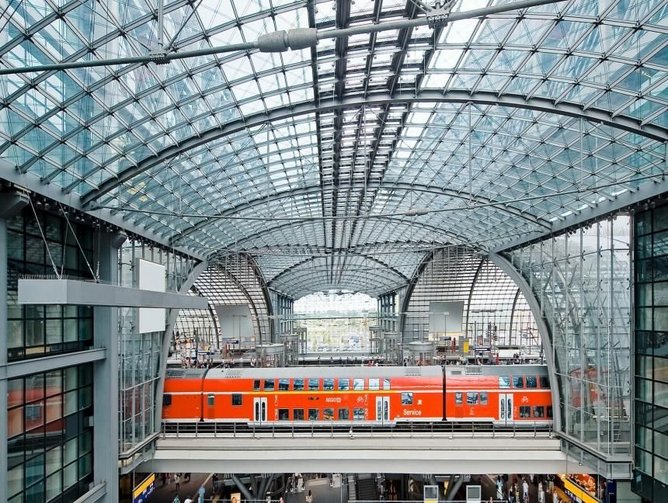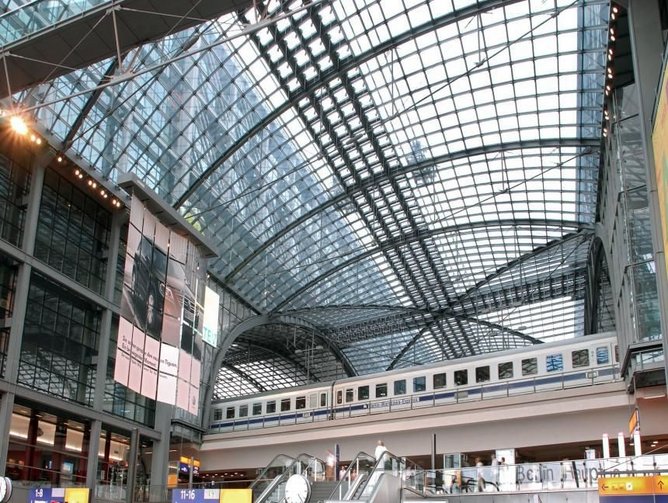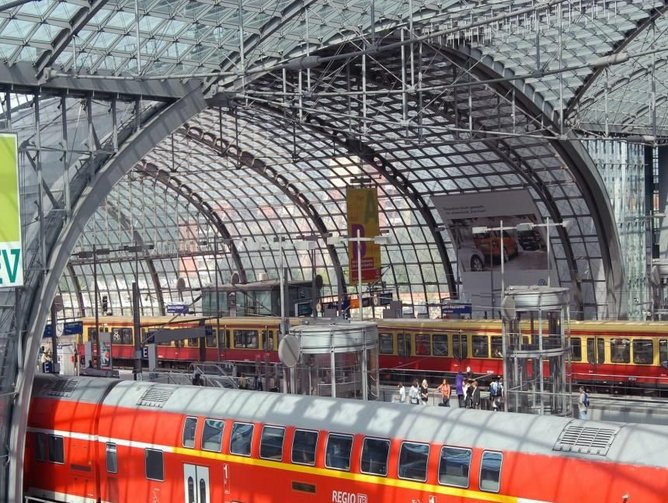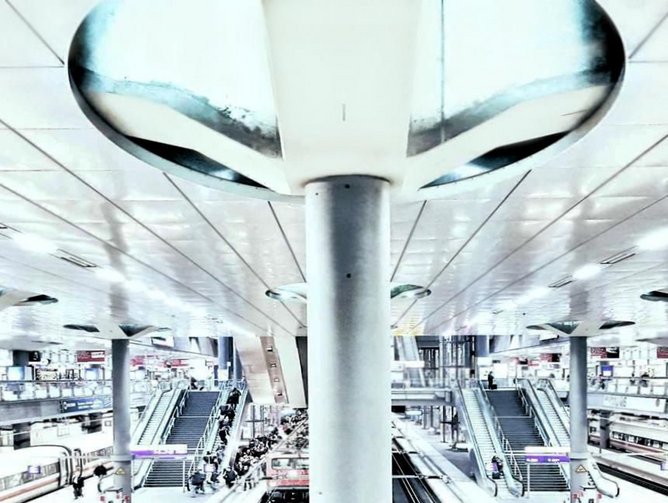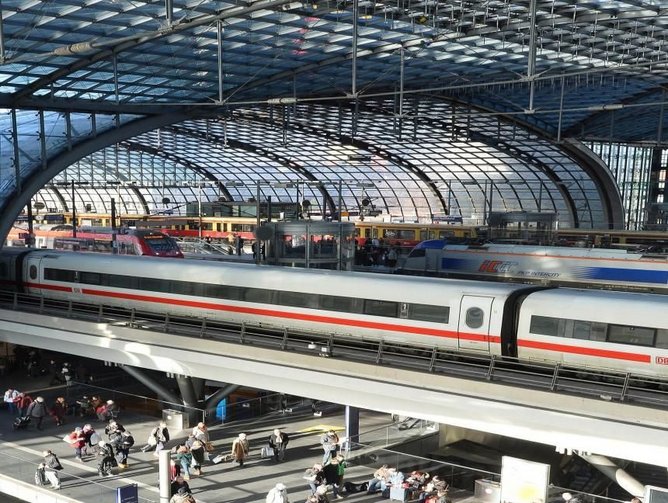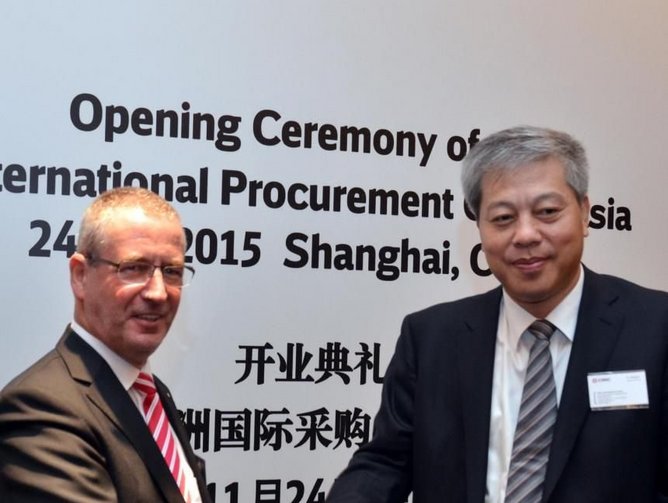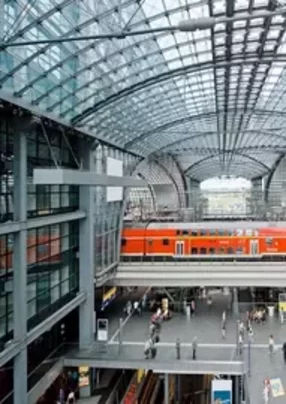The history of the railway in Germany began in 1835 with the opening of a six-kilometre line between the cities of Nuremberg and Furth, in today’s federal state of Bavaria. Some of the milestones in the now more than 180-year-old German railway history include the end of World War II and the rail reform in 1994, the year Deutsche Bahn AG was founded in a form of joint-stock company. The rail reform heralded a renaissance of the railway in Germany, and the facts are impressive.
Today Deutsche Bahn (DB) is active in all segments of the transport market with great success. DB is Europe's second largest carrier in the passenger transport market, bringing 4.3 billion passengers from A to B each year on buses and trains. We run 25,000 passenger trains each day, providing a wide variety of connections between cities and regions. DB is also the second largest freight transport and logistics provider worldwide. We have locations in 130 countries, where we operate 5,000 freight trains a day, transporting nearly a million tonnes through Germany and Europe. DB’s subsidiary company DB Arriva is active throughout Europe with buses and passenger trains. DB operates the largest rail network in the heart of Europe. Nearly 5,700 stations in Germany serve as gateways for our customers to our rail network of over 33,400 kilometres.
However the company’s performance suffered considerably in the recent months, and customers’ expectations have not been fulfilled. The company has been put under increasing pressure on the markets, with economic consequences. DB is currently facing major challenges due to the increasingly tough competition in passenger transport because of the liberalisation of the long distance coach market and various new sharing models, for example, as well as in freight transport because of the dramatic drop in fuel prices and reduced lorry tolls. Additionally, there is no doubt that digitalisation is fundamentally changing mobility as well as working environments, making it necessary for DB to adapt fast.
DB has therefore started the ‘Zukunft Bahn’ programme (Future of the Railway), with the objective of considerably increasing quality, punctuality and operational reliability, to start winning over more customers again and to noticeably improve our economic results. This programme will be a major lever to achieve the economic, environmental and social performance goals of the DB 2020 strategy.
We are convinced that rail transport has the potential to become the most important mode of transport for the 21st century – it is dependable, comfortable, safe and environmentally friendly. Rail is not only an important part of life for millions of people and a reliable partner of Germany's economy; it is also plays a key role in reaching climate targets in Europe.
The ‘Zukunft Bahn’ programme requires the involvement of all divisions of DB, working together for better quality, more customer focus and greater success. Central Procurement has a direct impact on EBIT and can thus make an important contribution to achieving success, which is why we have decided to realign its business in line with the rest of the group.
DB Procurement – on track towards ‘World Class Procurement’
Central Procurement has developed a mission statement to guide us in its work: We guarantee that the DB Group's business units worldwide are supplied with materials, capital goods and services – economically, on time and with the right quality – and, in so doing, ensure DB's innovative capability and sustainable market success.
Central Procurement has developed its own ‘World Class Procurement’ roadmap based on our DB2020 Group strategy and in line with our Procurement 2020 programme. Our roadmap was developed based on the results of a performance assessment and benchmarking process carried out by a renowned external consultancy. "The results of the assessment conferred us ‘professional’ status (top 25 percent of all assessed companies), which is a source of pride for us and our employees and motivates us to reach the ‘World Class’ level. We are working with our business partners to develop a roadmap through 2020," says Jan Grothe, Head of Procurement Principles and IT-Systems.
On this basis, Central Procurement will move from a classic corporate purchasing department to a ‘World Class Procurement’ unit over the next few years. To do so, Central Procurement has defined four central strategic directions as part of its roadmap.
- ‘Increasing Procurement's value added’: Aimed at achieving a close dovetailing of the targets of various Group subsidiaries and those of Central Procurement. Only through close coordination can all possible commercial and technical means be utilised to generate maximum added value for the Group.
- ‘Comprehensive business partner management’: Aimed at establishing Procurement as a part of the customers' management team and initiating and developing product group strategies within competency and cross functional teams in cooperation with stakeholders and technology and quality assurance units.
- ‘Effective Supplier Management’: Aimed at actively developing suppliers and the market on an international level and, when necessary, regaining or ensuring stable supplier performance levels with regard to quality, punctuality and cost.
- ‘Efficient (digital) processes and organisation’: Aimed at optimising and streamlining processes and regulations as well as IT support.
Special focus on the supply chain – our Supplier Management approach
Our suppliers serve as valuable partners as we strive to achieve greater safety, quality and innovation. "We want to win customers with reliable suppliers and sustainably shape the supply chain," says Uwe Günther, Chief Procurement Officer (CPO) of Deutsche Bahn AG, in describing the goals of his team and suppliers. Effective supplier management has thus been included as one of our four central strategic directions on our path to becoming a World Class Procurement unit.
DB's standardised Supplier Management process includes four phases:
Supplier Qualification, Supplier Development, Supplier Appraisal and Supplier Adjustment.
The first two phases help us to prepare suppliers to work with DB. Supplier Qualification includes an assessment of the supplier's technical and commercial suitability. Different supporting documents must be provided in this process depending on the requirement category of the specific range of products and services. In general, we want to complete Supplier Qualification prior to the bidding process and we see this as beneficial to both us and the supplier. In the optional Supplier Development phase, steps are taken to further develop suppliers who do not yet meet our criteria for qualification, independent of any contracts. Our Supplier Development phase is designed to improve our suppliers' performance through a shared dialogue and to expand their potential, minimise risks and ensure that they can take part in competitive bids going forward.
The following two phases ensure the high performance of our core suppliers and serve to integrate new suppliers. The Supplier Appraisal phase includes an evaluation of contract fulfilment according to defined criteria. In this phase, we evaluate suppliers along the supply chain in terms of quality, costs and punctuality. We assess suppliers based on their strategic importance to DB. We always evaluate promptly and throughout the entire business relationship. We inform our suppliers at least once a year of their rating as we see this exchange as quite important.
In the Supplier Adjustment phase, we monitor the suppliers which whom we have current contracts and projects to be able to respond quickly to changing situations.
Our standard process is rounded out by an incentive programme for suppliers with especially high performance. We show our appreciation of excellent suppliers with our DB Supplier Award and especially with our Supplier Innovation Award, which will be given for the first time in 2016.
Building alliances and strengthening networks – Internationalising DB Procurement
The increasing internationalisation of both the Group itself and procurement markets represents both a challenge and an opportunity on our path to achieving better quality in the Group and in Purchasing. Based on our World Class approach, we see the role of our department as follows: International DB Procurement bundling demands globally to achieve the best conditions by sourcing from the best suppliers world-wide with a significant benefit for all business units.
We have developed specific measures to achieve this goal
Our concept of a DB-wide Global Procurement Network is intended to enable all internal customers, staff members and managers who are involved with procurement centrally or locally to deal with the challenges and opportunities posed by the global markets. We are developing new formats to this end, from qualifying courses at our DB Institute of Procurement to regular discussion groups. "We can only reach our ambitious goals if our colleagues are highly qualified and have the specialist and language skills to analyse markets, innovations and risks within their product group on an international basis," says Arne Oehlsen, Head of the Procurement Customer Portal and Qualification Unit. He continues: "In our newly integrated qualification programme, we are also bringing together purchasers, managers and internal customers to learn about specific product groups and tendering issues as a team."
The opening of our International Procurement Office in Shanghai in November 2015 is aimed more at the supplier market. "Global Value Sourcing is one of the main procurement levers for a globally active group like DB. Together with experienced staff, we want to develop relationships with existing and new suppliers here locally in the Asian market," says Michael Boback, Head of DB AG's International Procurement Office Shanghai with regard to the office's objectives. "China plays an especially important role here, since over 80 percent of the market growth for high-speed trains over the past few years has been here. The production, development and testing capacities in China are state-of-the-art. We are looking to intensify contacts with companies who offer high-quality and innovative products at competitive prices, even though the price is not the sole decisive criterion.
As a driver of innovation, DB supports the cross-sector ‘RailSupply’ programme as a pioneering step towards comprehensive digitalisation of the supply chain. This solution makes daily collaboration between customers and suppliers more transparent and allows for cooperative processes across all levels of the industry, from rail operators to system providers and suppliers on different levels. Central Procurement can thus maximise supply security, innovative power, process stability and supply chain transparency for DB AG and can recognise bottlenecks at an early stage.
We are a founding member of the ‘Railsponsible’ sector initiative. Within this initiative, we are working together with our competitors to improve the sustainability and efficiency of our supply chain. As part of the initiative, suppliers are assessed based on defined standards, for example with regard their compliance with human rights, labour standards, environmental protection and activities to combat corruptions. "In this way, we as a group can fulfil our social obligations and create transparency and trust," says Jan Grothe. "We are also encouraging all of our competitors to actively work to achieve these goals."
The ambitious goals we have set as part of our World Class Procurement vision have put DB's Central Procurement on the right path for the future. Whether through our standardised process for Supplier Management, our measures to qualify suppliers or tapping new markets in Asia through our International Procurement Office in Shanghai, we are contributing to the Group's success through innovative approaches and are doing our part to deliver top-notch product and service quality for our customers, as part of the ‘Zukunft Bahn’ programme and the DB2020 strategy.

